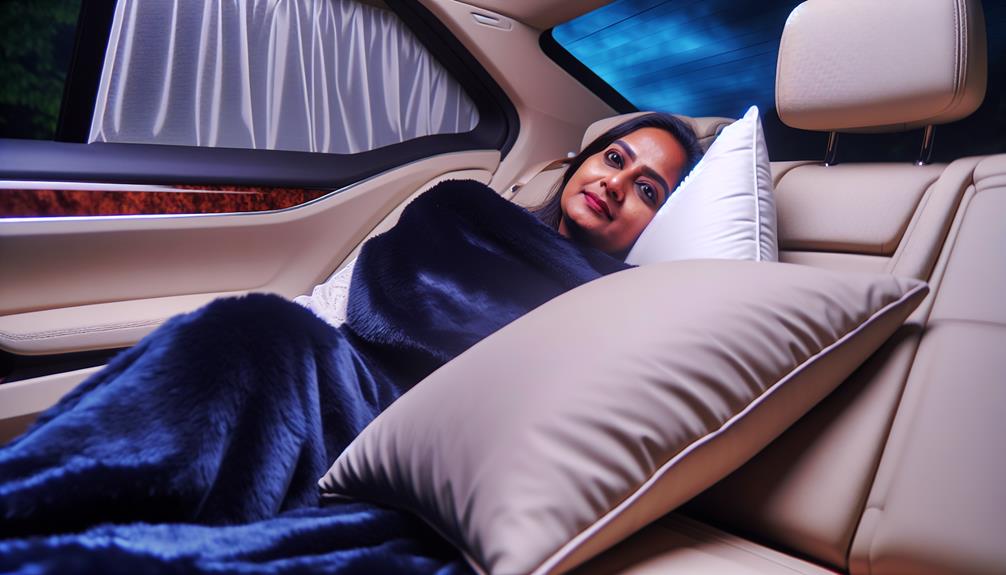When considering the option of sleeping in the back of your car, several factors come into play that warrant careful consideration. From the legal implications to ensuring safety and evaluating potential risks, each aspect requires thoughtful assessment.
While the idea of a portable bed on wheels may seem convenient, there are nuances that one must navigate. Understanding the benefits, drawbacks, and essential tips for a restful night in your vehicle can make all the difference.
This discussion will shed light on the intricacies involved in this common yet complex scenario.
Key Takeaways
- Prioritize safety measures and legal considerations when choosing to sleep in your car.
- Evaluate risks and benefits to make an informed decision about sleeping in your vehicle.
- Ensure comfort by utilizing suitable bedding and sleeping positions for a restful experience.
- Select safe and legal parking locations for privacy, security, and convenience while sleeping in your car.
Legal Considerations
When considering sleeping in a car, it is crucial to be aware of the legal implications and regulations regarding this practice in different jurisdictions. Parking restrictions play a significant role in determining where one can safely sleep in their vehicle. Many areas have specific rules regarding overnight parking, particularly in urban areas or residential neighborhoods. It is essential to research and adhere to these regulations to avoid fines or potential towing of the vehicle.
Privacy concerns are another aspect to consider when opting to sleep in a car. While it may seem like a convenient solution, individuals must ensure they are not violating any laws related to loitering or trespassing. Finding a safe and legal location to park for the night is paramount to avoid any legal issues. Additionally, being mindful of the surroundings and respecting the privacy of others is crucial in maintaining a positive relationship with the community and law enforcement.
Prioritizing privacy and following parking regulations will help ensure a smooth and lawful experience when sleeping in a car.
Safety Precautions
To ensure a secure environment while sleeping in a car, it is imperative to implement a comprehensive set of safety precautions. When planning to spend the night in your vehicle, consider the following:
- Emergency Supplies: Always have essential emergency supplies on hand, such as a first aid kit, flashlight, extra blankets, water, non-perishable snacks, and a fully charged mobile phone. These items can be crucial in unexpected situations and provide peace of mind during the night.
- Parking Locations: Choose well-lit, safe, and legal parking locations for the night. Opt for designated rest areas, campgrounds, or overnight parking lots that are frequented by other travelers. Avoid secluded or prohibited areas to minimize potential risks.
- Vehicle Security Measures: Prioritize your safety by locking all doors, closing windows partially for ventilation without compromising security, and considering using window shades for privacy. Additionally, position your vehicle in a way that allows for a quick and easy exit if needed.
Potential Risks
Consideration of potential risks is paramount when sleeping in a car, as various factors can impact the safety and well-being of individuals in this setting. When deciding to sleep in a car, individuals should assess the potential risks to personal safety and the environmental impact.
Potential Risks:
To help you make an informed decision, here are some key risks to consider:
| Risk Factor | Description |
|---|---|
| Personal Safety | Sleeping in a car may make individuals more vulnerable to theft, harassment, or even physical harm. |
| Environmental Impact | Poor ventilation in the car can lead to carbon monoxide poisoning or exposure to extreme temperatures. |
Benefits of Sleeping in Car
Assessing the potential benefits of sleeping in a car can provide insights into alternative accommodation options that cater to specific needs and preferences while considering the practicalities of such a choice. When contemplating sleeping in your car, there are notable advantages that can make it a viable option:
- Privacy Advantages: Sleeping in your car offers a level of privacy that may be hard to achieve in public accommodations or shared spaces. You have control over who can see or access your resting area, providing a sense of security and seclusion.
- Convenience Benefits: The convenience of being able to park and sleep, especially during long road trips or when in remote areas, can be a significant benefit. You can save time and money by avoiding the need to search for hotels or other lodging options, making it a practical choice for those on the go.
- Flexibility: Sleeping in your car allows for flexibility in your travel plans. You can easily adapt your sleeping arrangements to suit changing circumstances or locations without the constraints of traditional accommodation bookings.
Tips for Comfortable Sleep
Ensuring optimal comfort for sleeping in a car involves implementing strategic adjustments to maximize rest quality and support overall well-being during rest periods. When it comes to sleeping in a car, choosing the right sleeping position and bedding options can significantly impact your comfort levels. Here are some tips to help you achieve a more comfortable sleep in your car:
| Sleeping Position | Description | Benefits |
|---|---|---|
| Reclined | Angle the front seats back | Supports the natural curve of the spine |
| Side | Curl up on your side | Relieves pressure points and aids in digestion |
| Semi-Fetal | Back slightly reclined, knees up | Improves circulation and reduces lower back strain |
When it comes to bedding options, consider using a memory foam mattress topper or a sleeping bag for added comfort. Additionally, using pillows and blankets can help create a cozy sleeping environment. Experiment with different combinations to find what works best for you and ensures a restful sleep in your car.
Frequently Asked Questions
Can I Sleep in the Back of My Car if I'm Parked on Private Property?
When parked on private property, sleeping in your car raises safety concerns and potential noise disturbances. Be mindful of local ordinances, property owner permissions, and ensure your well-being by considering alternative, designated sleeping arrangements.
Is It Legal to Sleep in My Car if I Have Tinted Windows for Privacy?
Privacy concerns must be addressed when considering sleeping in a car with tinted windows. Adhere to safety precautions by ensuring proper ventilation. Comfort tips include using blankets or sleeping bags. Maintain hygiene practices by having personal care items easily accessible.
Are There Any Specific Laws or Regulations Regarding Sleeping in Cars in Different States or Countries?
Various states and countries have specific camping regulations that may impact vehicle dwellers. It is crucial to research and understand local laws regarding sleeping in cars to ensure compliance and avoid potential legal issues.
Can I Be Charged With a Crime for Sleeping in My Car in a Public Parking Lot?
Sleeping in a car in a public parking lot can lead to charges based on local laws. Safety concerns, like impaired drivers or vehicle break-ins, and the aim to prevent homelessness are often considered in such regulations.
What Are Some Alternative Options for Sleeping in My Car if I Want to Avoid Potential Legal Issues?
To avoid potential legal issues when seeking alternatives to sleeping in a car, consider camping grounds as a safe haven or explore Airbnb options for a comfortable stay. These choices offer security and amenities for a peaceful rest.
Conclusion
In conclusion, sleeping in the back of a car can be a viable option for rest, but it is important to consider legal regulations, safety precautions, and potential risks.
Despite these factors, there are benefits to sleeping in a car, such as flexibility and cost-effectiveness. According to a survey conducted by the National Association of Realtors, 14% of adults have reported sleeping in their car at least once in their lifetime.

